Political Economy Analysis: Local Government During COVID-19 Pandemic
VerifiedAdded on 2022/02/21
|13
|3710
|46
Report
AI Summary
This report, prepared by a student from the Department of Public Administration at the University of Dhaka, investigates the role of local government bodies, specifically the Saliyakandi Union Parishad, during the COVID-19 pandemic through the lens of political economy. It begins by defining political economy, its components, and various theoretical frameworks such as liberalism, Marxism, and economic nationalism. The report explores the interdisciplinary nature of political economy, examining its intersection with economics, sociology, and political science. It then provides an overview of local government, its features, classifications, and relationship with the central government, particularly in the context of Bangladesh. The core of the report analyzes how political economy principles, including the interplay of politics and economics, influence local governance and the delivery of public services during the pandemic. It highlights the financial aspects of local government, including revenue generation and resource allocation, and discusses the impact of political decisions on economic outcomes at the local level. The study aims to understand how local government bodies manage and govern their territories, considering both political and economic factors, particularly in the context of the COVID-19 crisis. The report concludes by emphasizing the importance of local government in ensuring participatory development and grass-root level democracy.
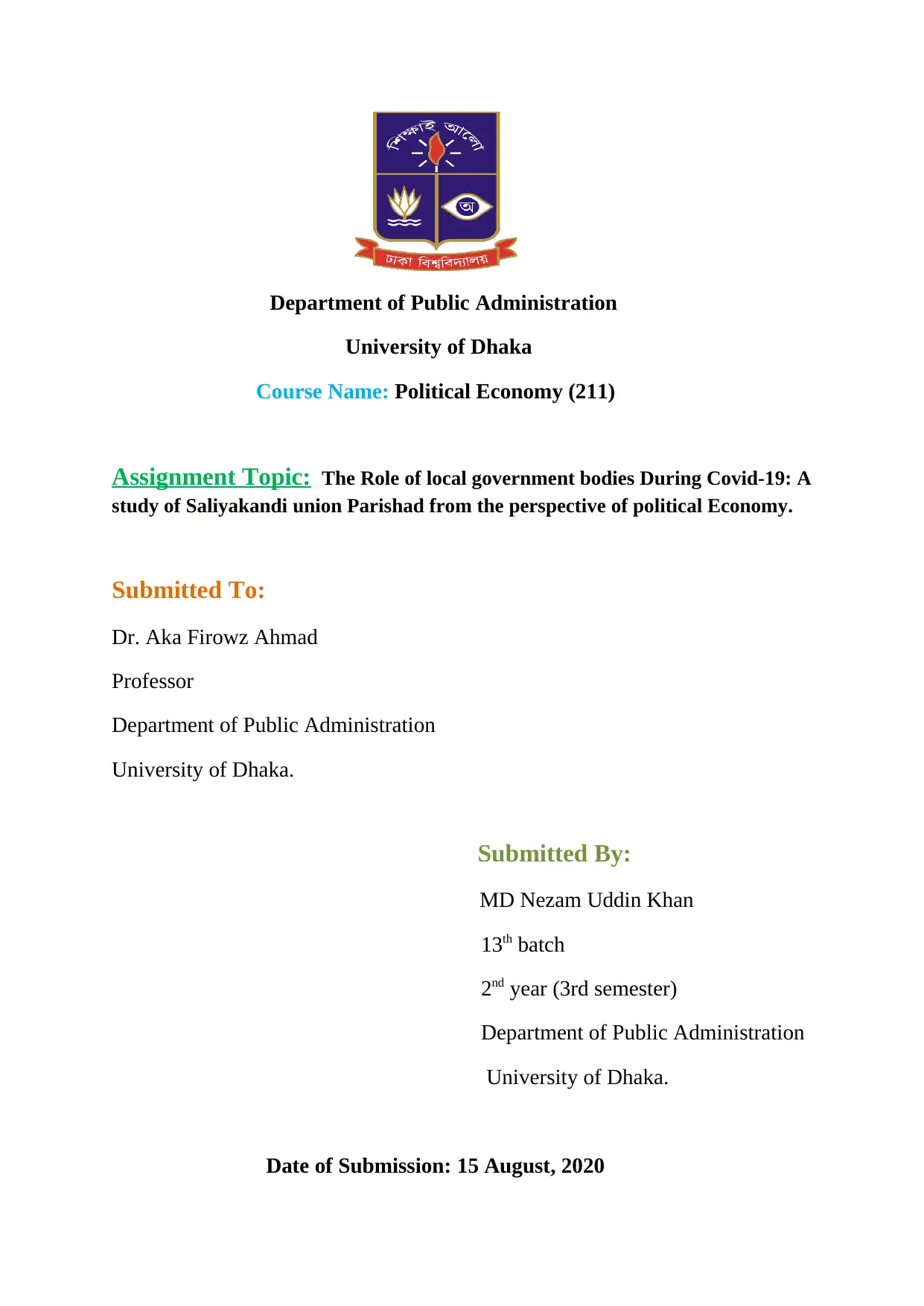
Department of Public Administration
University of Dhaka
Course Name: Political Economy (211)
Assignment Topic: The Role of local government bodies During Covid-19: A
study of Saliyakandi union Parishad from the perspective of political Economy.
Submitted To:
Dr. Aka Firowz Ahmad
Professor
Department of Public Administration
University of Dhaka.
Submitted By:
MD Nezam Uddin Khan
13th batch
2nd year (3rd semester)
Department of Public Administration
University of Dhaka.
Date of Submission: 15 August, 2020
University of Dhaka
Course Name: Political Economy (211)
Assignment Topic: The Role of local government bodies During Covid-19: A
study of Saliyakandi union Parishad from the perspective of political Economy.
Submitted To:
Dr. Aka Firowz Ahmad
Professor
Department of Public Administration
University of Dhaka.
Submitted By:
MD Nezam Uddin Khan
13th batch
2nd year (3rd semester)
Department of Public Administration
University of Dhaka.
Date of Submission: 15 August, 2020
Paraphrase This Document
Need a fresh take? Get an instant paraphrase of this document with our AI Paraphraser
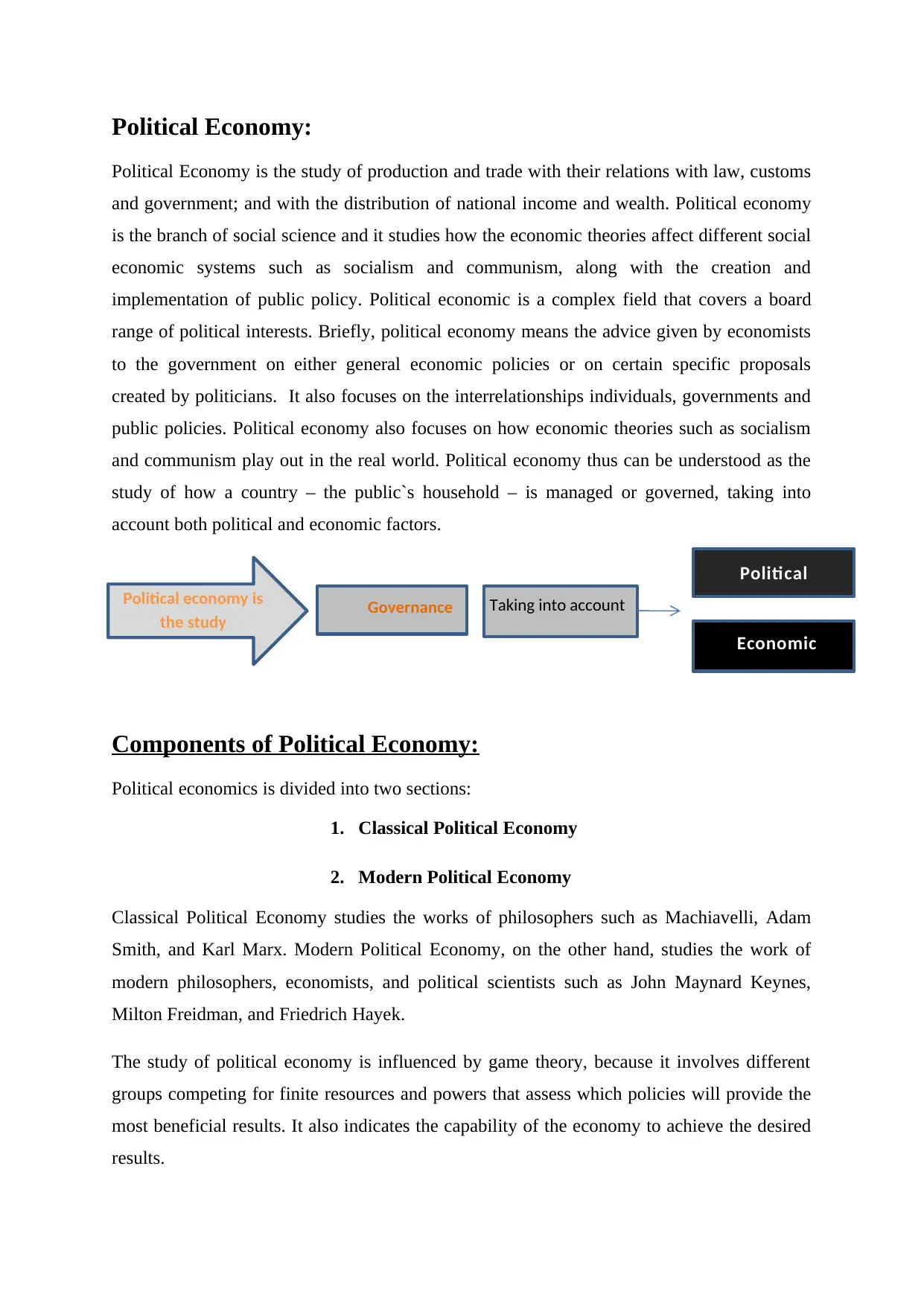
Political Economy:
Political Economy is the study of production and trade with their relations with law, customs
and government; and with the distribution of national income and wealth. Political economy
is the branch of social science and it studies how the economic theories affect different social
economic systems such as socialism and communism, along with the creation and
implementation of public policy. Political economic is a complex field that covers a board
range of political interests. Briefly, political economy means the advice given by economists
to the government on either general economic policies or on certain specific proposals
created by politicians. It also focuses on the interrelationships individuals, governments and
public policies. Political economy also focuses on how economic theories such as socialism
and communism play out in the real world. Political economy thus can be understood as the
study of how a country – the public`s household – is managed or governed, taking into
account both political and economic factors.
Components of Political Economy:
Political economics is divided into two sections:
1. Classical Political Economy
2. Modern Political Economy
Classical Political Economy studies the works of philosophers such as Machiavelli, Adam
Smith, and Karl Marx. Modern Political Economy, on the other hand, studies the work of
modern philosophers, economists, and political scientists such as John Maynard Keynes,
Milton Freidman, and Friedrich Hayek.
The study of political economy is influenced by game theory, because it involves different
groups competing for finite resources and powers that assess which policies will provide the
most beneficial results. It also indicates the capability of the economy to achieve the desired
results.
Political economy is
the study Governance Taking into account
Political
Economic
Political Economy is the study of production and trade with their relations with law, customs
and government; and with the distribution of national income and wealth. Political economy
is the branch of social science and it studies how the economic theories affect different social
economic systems such as socialism and communism, along with the creation and
implementation of public policy. Political economic is a complex field that covers a board
range of political interests. Briefly, political economy means the advice given by economists
to the government on either general economic policies or on certain specific proposals
created by politicians. It also focuses on the interrelationships individuals, governments and
public policies. Political economy also focuses on how economic theories such as socialism
and communism play out in the real world. Political economy thus can be understood as the
study of how a country – the public`s household – is managed or governed, taking into
account both political and economic factors.
Components of Political Economy:
Political economics is divided into two sections:
1. Classical Political Economy
2. Modern Political Economy
Classical Political Economy studies the works of philosophers such as Machiavelli, Adam
Smith, and Karl Marx. Modern Political Economy, on the other hand, studies the work of
modern philosophers, economists, and political scientists such as John Maynard Keynes,
Milton Freidman, and Friedrich Hayek.
The study of political economy is influenced by game theory, because it involves different
groups competing for finite resources and powers that assess which policies will provide the
most beneficial results. It also indicates the capability of the economy to achieve the desired
results.
Political economy is
the study Governance Taking into account
Political
Economic
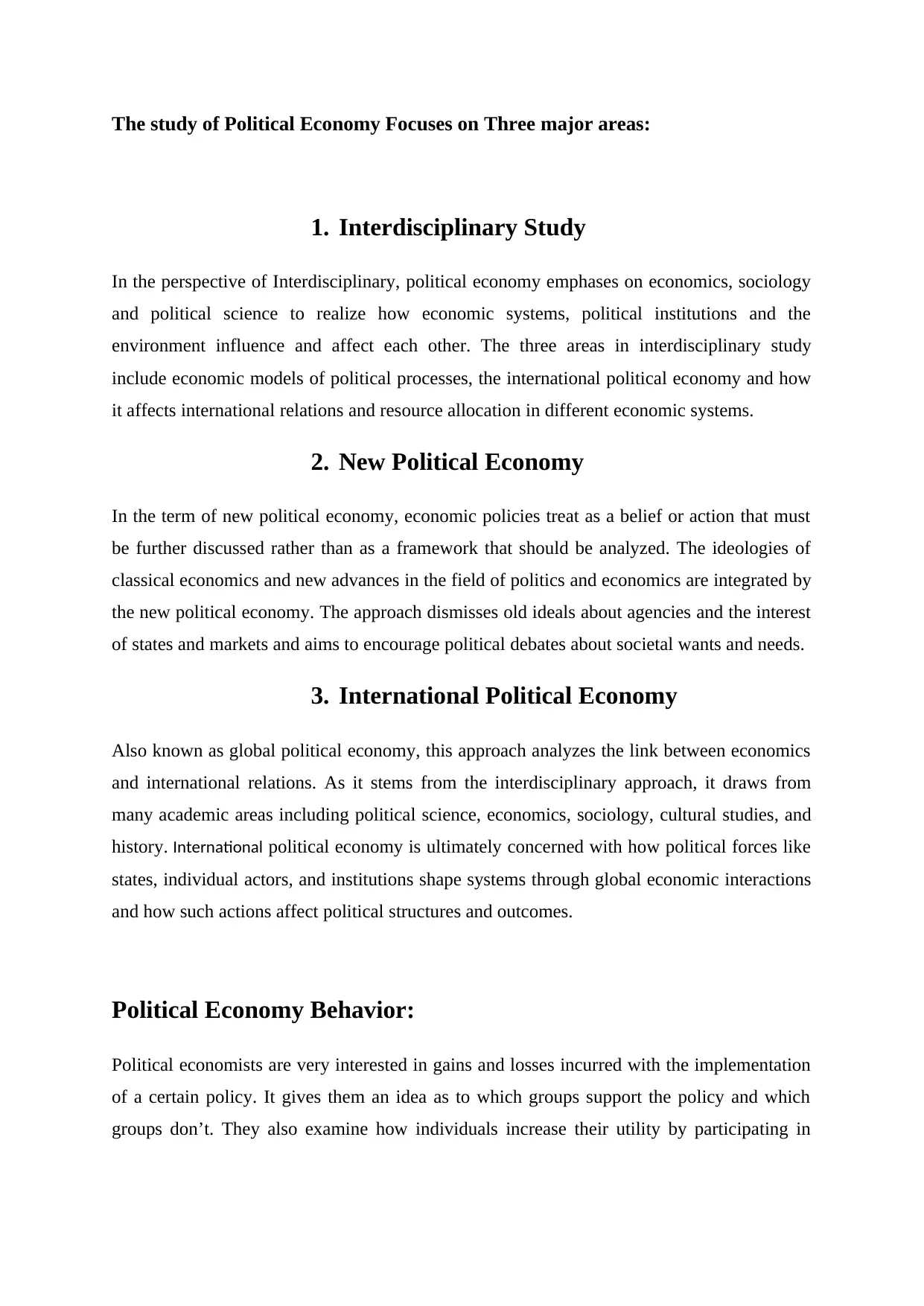
The study of Political Economy Focuses on Three major areas:
1. Interdisciplinary Study
In the perspective of Interdisciplinary, political economy emphases on economics, sociology
and political science to realize how economic systems, political institutions and the
environment influence and affect each other. The three areas in interdisciplinary study
include economic models of political processes, the international political economy and how
it affects international relations and resource allocation in different economic systems.
2. New Political Economy
In the term of new political economy, economic policies treat as a belief or action that must
be further discussed rather than as a framework that should be analyzed. The ideologies of
classical economics and new advances in the field of politics and economics are integrated by
the new political economy. The approach dismisses old ideals about agencies and the interest
of states and markets and aims to encourage political debates about societal wants and needs.
3. International Political Economy
Also known as global political economy, this approach analyzes the link between economics
and international relations. As it stems from the interdisciplinary approach, it draws from
many academic areas including political science, economics, sociology, cultural studies, and
history. International political economy is ultimately concerned with how political forces like
states, individual actors, and institutions shape systems through global economic interactions
and how such actions affect political structures and outcomes.
Political Economy Behavior:
Political economists are very interested in gains and losses incurred with the implementation
of a certain policy. It gives them an idea as to which groups support the policy and which
groups don’t. They also examine how individuals increase their utility by participating in
1. Interdisciplinary Study
In the perspective of Interdisciplinary, political economy emphases on economics, sociology
and political science to realize how economic systems, political institutions and the
environment influence and affect each other. The three areas in interdisciplinary study
include economic models of political processes, the international political economy and how
it affects international relations and resource allocation in different economic systems.
2. New Political Economy
In the term of new political economy, economic policies treat as a belief or action that must
be further discussed rather than as a framework that should be analyzed. The ideologies of
classical economics and new advances in the field of politics and economics are integrated by
the new political economy. The approach dismisses old ideals about agencies and the interest
of states and markets and aims to encourage political debates about societal wants and needs.
3. International Political Economy
Also known as global political economy, this approach analyzes the link between economics
and international relations. As it stems from the interdisciplinary approach, it draws from
many academic areas including political science, economics, sociology, cultural studies, and
history. International political economy is ultimately concerned with how political forces like
states, individual actors, and institutions shape systems through global economic interactions
and how such actions affect political structures and outcomes.
Political Economy Behavior:
Political economists are very interested in gains and losses incurred with the implementation
of a certain policy. It gives them an idea as to which groups support the policy and which
groups don’t. They also examine how individuals increase their utility by participating in
⊘ This is a preview!⊘
Do you want full access?
Subscribe today to unlock all pages.

Trusted by 1+ million students worldwide
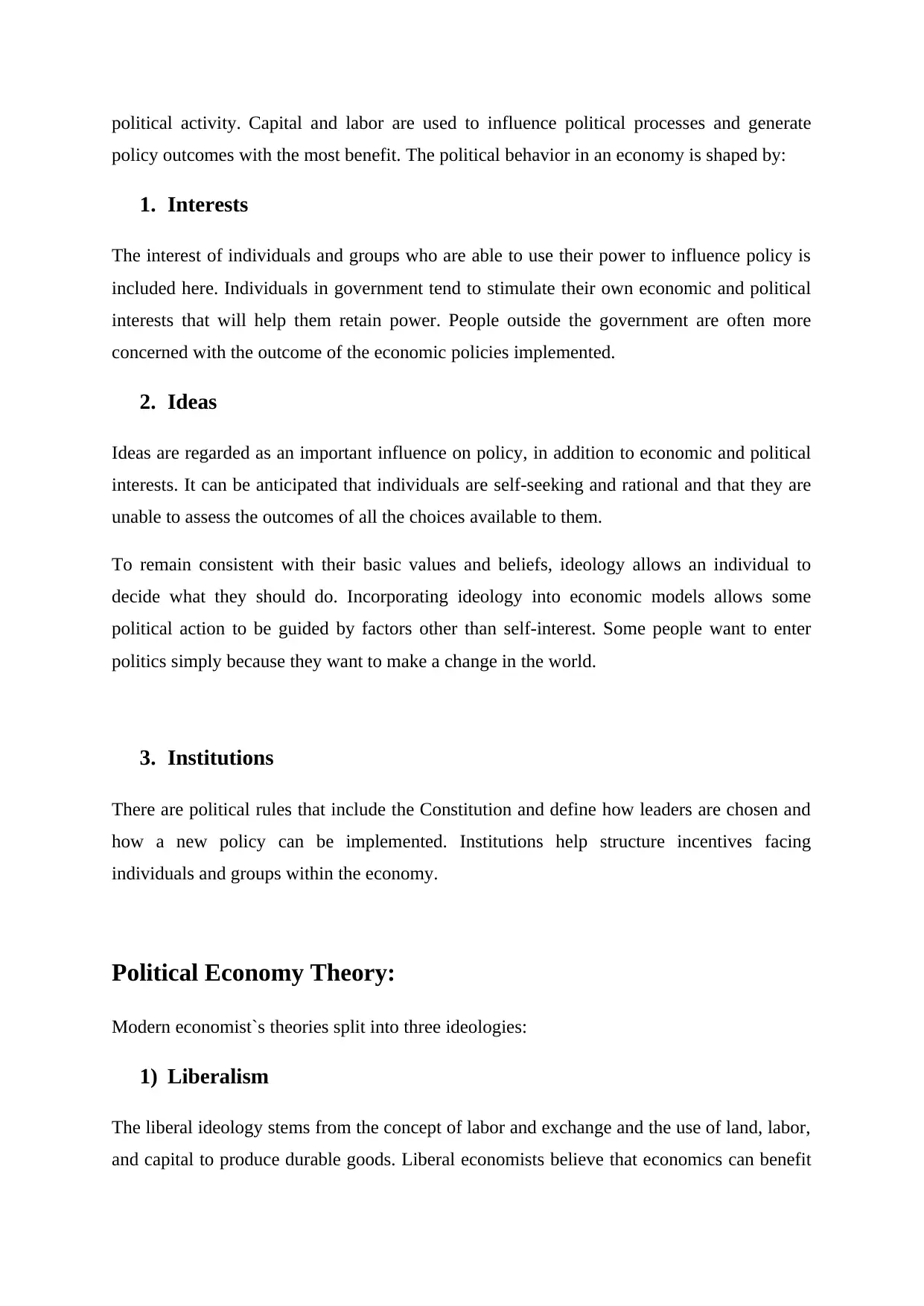
political activity. Capital and labor are used to influence political processes and generate
policy outcomes with the most benefit. The political behavior in an economy is shaped by:
1. Interests
The interest of individuals and groups who are able to use their power to influence policy is
included here. Individuals in government tend to stimulate their own economic and political
interests that will help them retain power. People outside the government are often more
concerned with the outcome of the economic policies implemented.
2. Ideas
Ideas are regarded as an important influence on policy, in addition to economic and political
interests. It can be anticipated that individuals are self-seeking and rational and that they are
unable to assess the outcomes of all the choices available to them.
To remain consistent with their basic values and beliefs, ideology allows an individual to
decide what they should do. Incorporating ideology into economic models allows some
political action to be guided by factors other than self-interest. Some people want to enter
politics simply because they want to make a change in the world.
3. Institutions
There are political rules that include the Constitution and define how leaders are chosen and
how a new policy can be implemented. Institutions help structure incentives facing
individuals and groups within the economy.
Political Economy Theory:
Modern economist`s theories split into three ideologies:
1) Liberalism
The liberal ideology stems from the concept of labor and exchange and the use of land, labor,
and capital to produce durable goods. Liberal economists believe that economics can benefit
policy outcomes with the most benefit. The political behavior in an economy is shaped by:
1. Interests
The interest of individuals and groups who are able to use their power to influence policy is
included here. Individuals in government tend to stimulate their own economic and political
interests that will help them retain power. People outside the government are often more
concerned with the outcome of the economic policies implemented.
2. Ideas
Ideas are regarded as an important influence on policy, in addition to economic and political
interests. It can be anticipated that individuals are self-seeking and rational and that they are
unable to assess the outcomes of all the choices available to them.
To remain consistent with their basic values and beliefs, ideology allows an individual to
decide what they should do. Incorporating ideology into economic models allows some
political action to be guided by factors other than self-interest. Some people want to enter
politics simply because they want to make a change in the world.
3. Institutions
There are political rules that include the Constitution and define how leaders are chosen and
how a new policy can be implemented. Institutions help structure incentives facing
individuals and groups within the economy.
Political Economy Theory:
Modern economist`s theories split into three ideologies:
1) Liberalism
The liberal ideology stems from the concept of labor and exchange and the use of land, labor,
and capital to produce durable goods. Liberal economists believe that economics can benefit
Paraphrase This Document
Need a fresh take? Get an instant paraphrase of this document with our AI Paraphraser
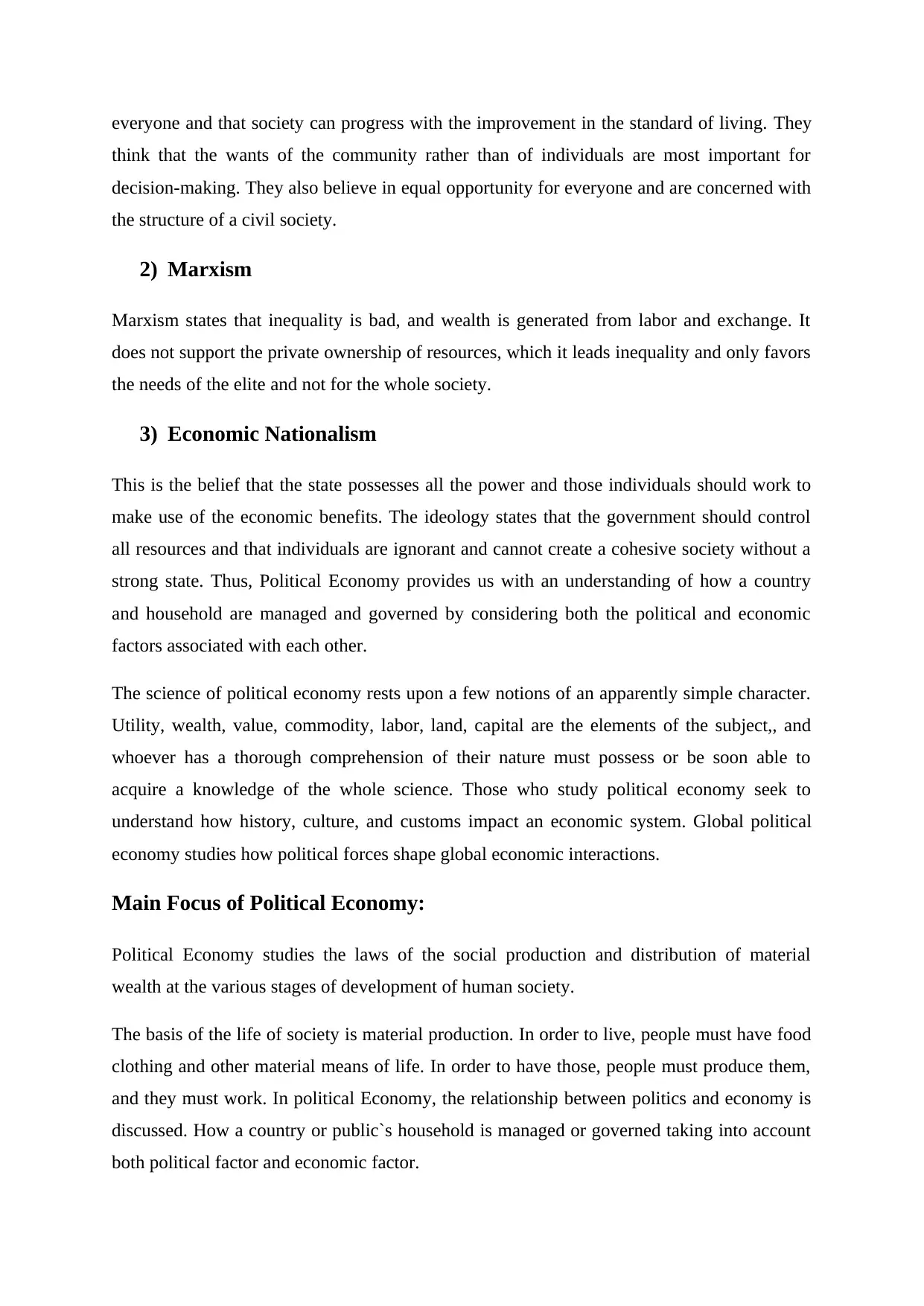
everyone and that society can progress with the improvement in the standard of living. They
think that the wants of the community rather than of individuals are most important for
decision-making. They also believe in equal opportunity for everyone and are concerned with
the structure of a civil society.
2) Marxism
Marxism states that inequality is bad, and wealth is generated from labor and exchange. It
does not support the private ownership of resources, which it leads inequality and only favors
the needs of the elite and not for the whole society.
3) Economic Nationalism
This is the belief that the state possesses all the power and those individuals should work to
make use of the economic benefits. The ideology states that the government should control
all resources and that individuals are ignorant and cannot create a cohesive society without a
strong state. Thus, Political Economy provides us with an understanding of how a country
and household are managed and governed by considering both the political and economic
factors associated with each other.
The science of political economy rests upon a few notions of an apparently simple character.
Utility, wealth, value, commodity, labor, land, capital are the elements of the subject,, and
whoever has a thorough comprehension of their nature must possess or be soon able to
acquire a knowledge of the whole science. Those who study political economy seek to
understand how history, culture, and customs impact an economic system. Global political
economy studies how political forces shape global economic interactions.
Main Focus of Political Economy:
Political Economy studies the laws of the social production and distribution of material
wealth at the various stages of development of human society.
The basis of the life of society is material production. In order to live, people must have food
clothing and other material means of life. In order to have those, people must produce them,
and they must work. In political Economy, the relationship between politics and economy is
discussed. How a country or public`s household is managed or governed taking into account
both political factor and economic factor.
think that the wants of the community rather than of individuals are most important for
decision-making. They also believe in equal opportunity for everyone and are concerned with
the structure of a civil society.
2) Marxism
Marxism states that inequality is bad, and wealth is generated from labor and exchange. It
does not support the private ownership of resources, which it leads inequality and only favors
the needs of the elite and not for the whole society.
3) Economic Nationalism
This is the belief that the state possesses all the power and those individuals should work to
make use of the economic benefits. The ideology states that the government should control
all resources and that individuals are ignorant and cannot create a cohesive society without a
strong state. Thus, Political Economy provides us with an understanding of how a country
and household are managed and governed by considering both the political and economic
factors associated with each other.
The science of political economy rests upon a few notions of an apparently simple character.
Utility, wealth, value, commodity, labor, land, capital are the elements of the subject,, and
whoever has a thorough comprehension of their nature must possess or be soon able to
acquire a knowledge of the whole science. Those who study political economy seek to
understand how history, culture, and customs impact an economic system. Global political
economy studies how political forces shape global economic interactions.
Main Focus of Political Economy:
Political Economy studies the laws of the social production and distribution of material
wealth at the various stages of development of human society.
The basis of the life of society is material production. In order to live, people must have food
clothing and other material means of life. In order to have those, people must produce them,
and they must work. In political Economy, the relationship between politics and economy is
discussed. How a country or public`s household is managed or governed taking into account
both political factor and economic factor.
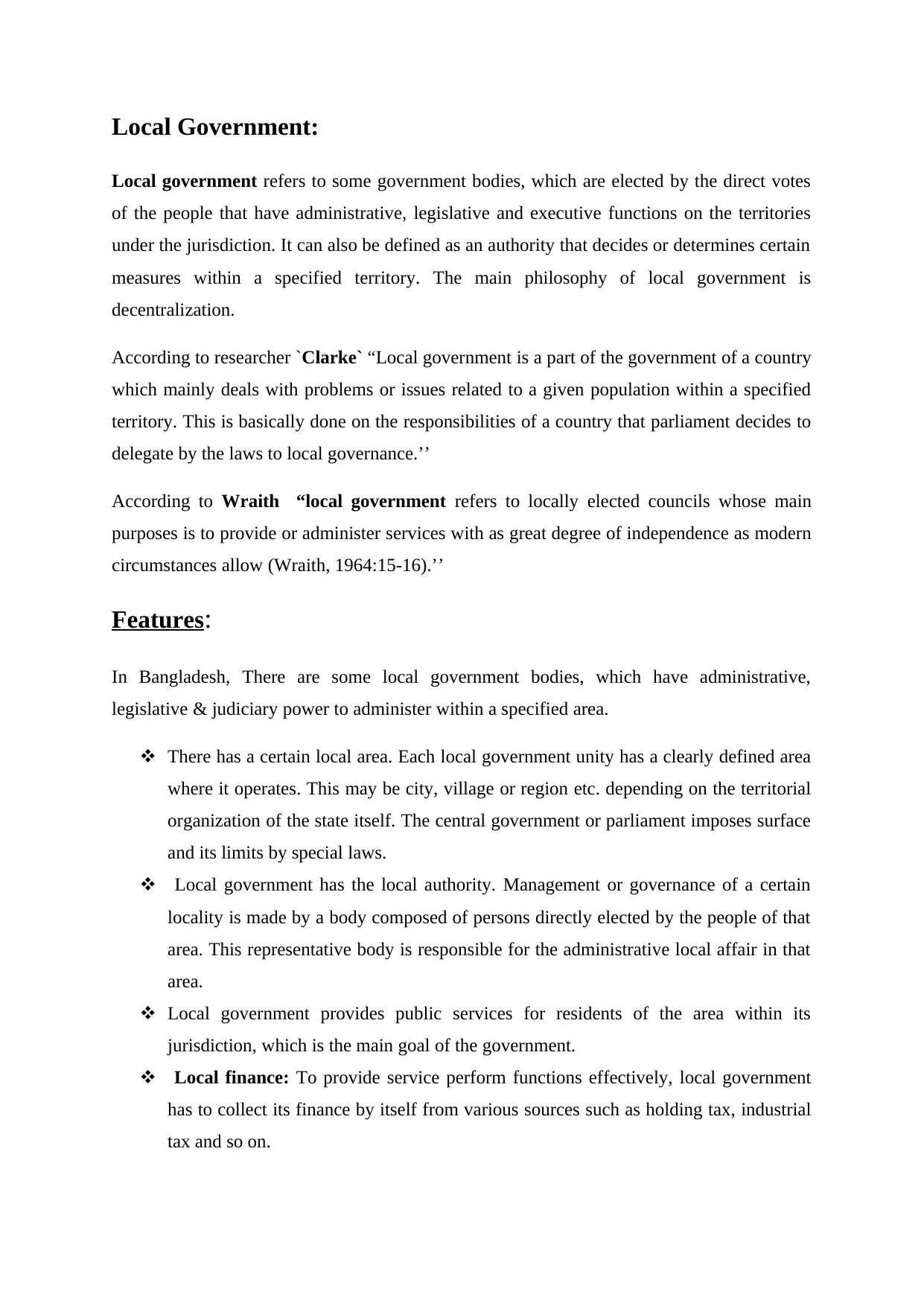
Local Government:
Local government refers to some government bodies, which are elected by the direct votes
of the people that have administrative, legislative and executive functions on the territories
under the jurisdiction. It can also be defined as an authority that decides or determines certain
measures within a specified territory. The main philosophy of local government is
decentralization.
According to researcher `Clarke` “Local government is a part of the government of a country
which mainly deals with problems or issues related to a given population within a specified
territory. This is basically done on the responsibilities of a country that parliament decides to
delegate by the laws to local governance.’’
According to Wraith “local government refers to locally elected councils whose main
purposes is to provide or administer services with as great degree of independence as modern
circumstances allow (Wraith, 1964:15-16).’’
Features:
In Bangladesh, There are some local government bodies, which have administrative,
legislative & judiciary power to administer within a specified area.
There has a certain local area. Each local government unity has a clearly defined area
where it operates. This may be city, village or region etc. depending on the territorial
organization of the state itself. The central government or parliament imposes surface
and its limits by special laws.
Local government has the local authority. Management or governance of a certain
locality is made by a body composed of persons directly elected by the people of that
area. This representative body is responsible for the administrative local affair in that
area.
Local government provides public services for residents of the area within its
jurisdiction, which is the main goal of the government.
Local finance: To provide service perform functions effectively, local government
has to collect its finance by itself from various sources such as holding tax, industrial
tax and so on.
Local government refers to some government bodies, which are elected by the direct votes
of the people that have administrative, legislative and executive functions on the territories
under the jurisdiction. It can also be defined as an authority that decides or determines certain
measures within a specified territory. The main philosophy of local government is
decentralization.
According to researcher `Clarke` “Local government is a part of the government of a country
which mainly deals with problems or issues related to a given population within a specified
territory. This is basically done on the responsibilities of a country that parliament decides to
delegate by the laws to local governance.’’
According to Wraith “local government refers to locally elected councils whose main
purposes is to provide or administer services with as great degree of independence as modern
circumstances allow (Wraith, 1964:15-16).’’
Features:
In Bangladesh, There are some local government bodies, which have administrative,
legislative & judiciary power to administer within a specified area.
There has a certain local area. Each local government unity has a clearly defined area
where it operates. This may be city, village or region etc. depending on the territorial
organization of the state itself. The central government or parliament imposes surface
and its limits by special laws.
Local government has the local authority. Management or governance of a certain
locality is made by a body composed of persons directly elected by the people of that
area. This representative body is responsible for the administrative local affair in that
area.
Local government provides public services for residents of the area within its
jurisdiction, which is the main goal of the government.
Local finance: To provide service perform functions effectively, local government
has to collect its finance by itself from various sources such as holding tax, industrial
tax and so on.
⊘ This is a preview!⊘
Do you want full access?
Subscribe today to unlock all pages.

Trusted by 1+ million students worldwide
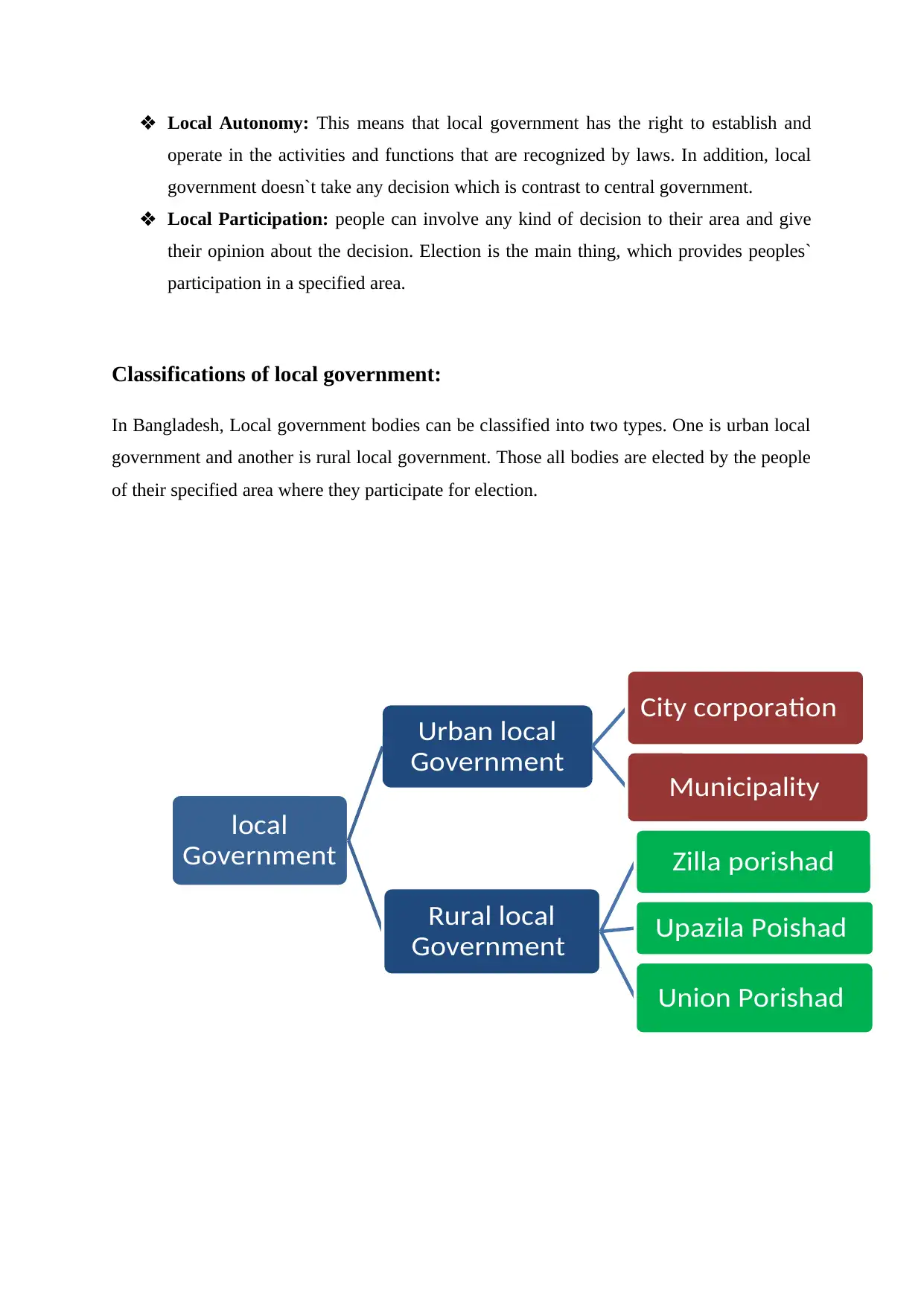
Local Autonomy: This means that local government has the right to establish and
operate in the activities and functions that are recognized by laws. In addition, local
government doesn`t take any decision which is contrast to central government.
Local Participation: people can involve any kind of decision to their area and give
their opinion about the decision. Election is the main thing, which provides peoples`
participation in a specified area.
Classifications of local government:
In Bangladesh, Local government bodies can be classified into two types. One is urban local
government and another is rural local government. Those all bodies are elected by the people
of their specified area where they participate for election.
local
Government
Urban local
Government
City corporation
Municipality
Rural local
Government
Zilla porishad
Upazila Poishad
Union Porishad
operate in the activities and functions that are recognized by laws. In addition, local
government doesn`t take any decision which is contrast to central government.
Local Participation: people can involve any kind of decision to their area and give
their opinion about the decision. Election is the main thing, which provides peoples`
participation in a specified area.
Classifications of local government:
In Bangladesh, Local government bodies can be classified into two types. One is urban local
government and another is rural local government. Those all bodies are elected by the people
of their specified area where they participate for election.
local
Government
Urban local
Government
City corporation
Municipality
Rural local
Government
Zilla porishad
Upazila Poishad
Union Porishad
Paraphrase This Document
Need a fresh take? Get an instant paraphrase of this document with our AI Paraphraser
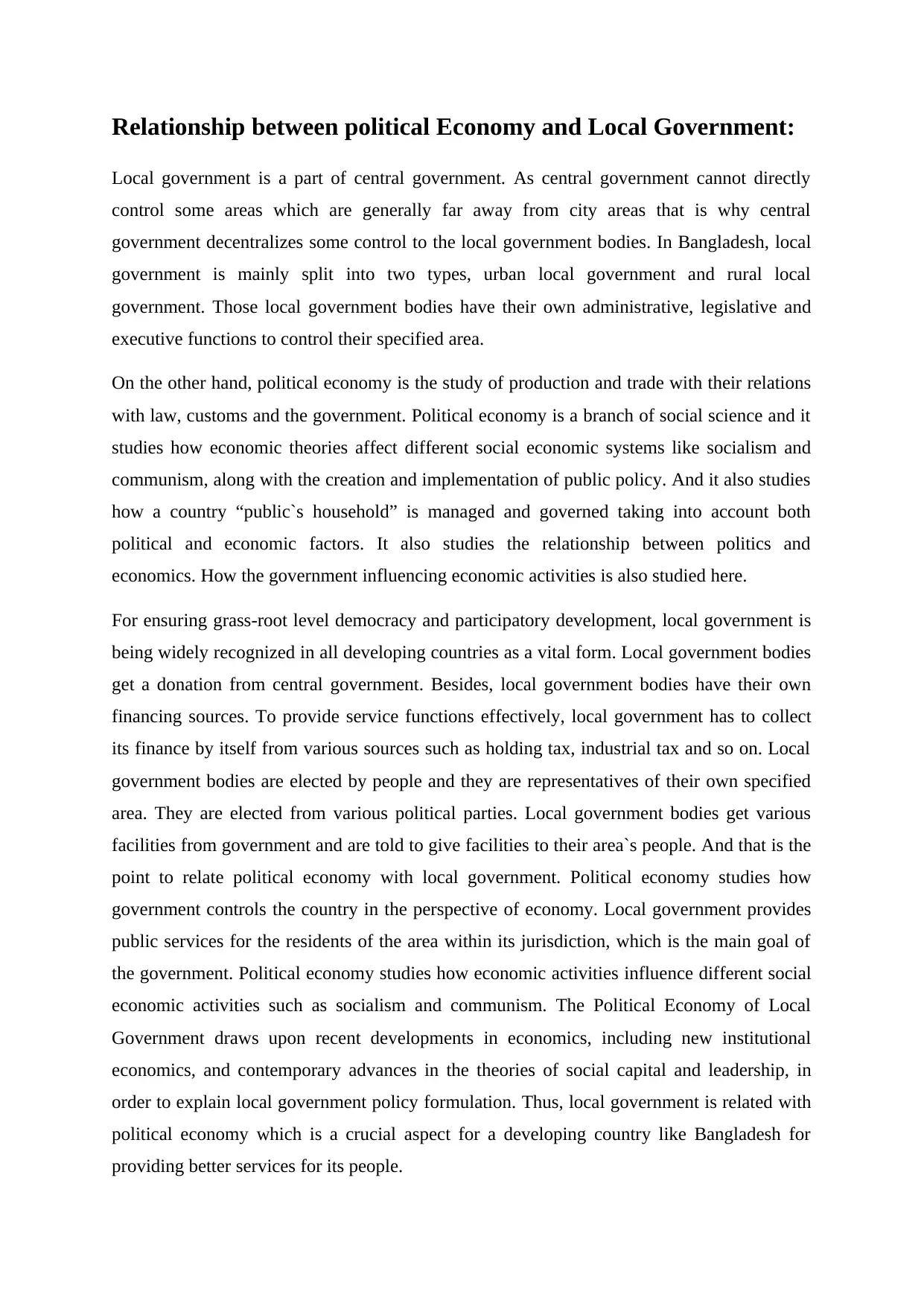
Relationship between political Economy and Local Government:
Local government is a part of central government. As central government cannot directly
control some areas which are generally far away from city areas that is why central
government decentralizes some control to the local government bodies. In Bangladesh, local
government is mainly split into two types, urban local government and rural local
government. Those local government bodies have their own administrative, legislative and
executive functions to control their specified area.
On the other hand, political economy is the study of production and trade with their relations
with law, customs and the government. Political economy is a branch of social science and it
studies how economic theories affect different social economic systems like socialism and
communism, along with the creation and implementation of public policy. And it also studies
how a country “public`s household” is managed and governed taking into account both
political and economic factors. It also studies the relationship between politics and
economics. How the government influencing economic activities is also studied here.
For ensuring grass-root level democracy and participatory development, local government is
being widely recognized in all developing countries as a vital form. Local government bodies
get a donation from central government. Besides, local government bodies have their own
financing sources. To provide service functions effectively, local government has to collect
its finance by itself from various sources such as holding tax, industrial tax and so on. Local
government bodies are elected by people and they are representatives of their own specified
area. They are elected from various political parties. Local government bodies get various
facilities from government and are told to give facilities to their area`s people. And that is the
point to relate political economy with local government. Political economy studies how
government controls the country in the perspective of economy. Local government provides
public services for the residents of the area within its jurisdiction, which is the main goal of
the government. Political economy studies how economic activities influence different social
economic activities such as socialism and communism. The Political Economy of Local
Government draws upon recent developments in economics, including new institutional
economics, and contemporary advances in the theories of social capital and leadership, in
order to explain local government policy formulation. Thus, local government is related with
political economy which is a crucial aspect for a developing country like Bangladesh for
providing better services for its people.
Local government is a part of central government. As central government cannot directly
control some areas which are generally far away from city areas that is why central
government decentralizes some control to the local government bodies. In Bangladesh, local
government is mainly split into two types, urban local government and rural local
government. Those local government bodies have their own administrative, legislative and
executive functions to control their specified area.
On the other hand, political economy is the study of production and trade with their relations
with law, customs and the government. Political economy is a branch of social science and it
studies how economic theories affect different social economic systems like socialism and
communism, along with the creation and implementation of public policy. And it also studies
how a country “public`s household” is managed and governed taking into account both
political and economic factors. It also studies the relationship between politics and
economics. How the government influencing economic activities is also studied here.
For ensuring grass-root level democracy and participatory development, local government is
being widely recognized in all developing countries as a vital form. Local government bodies
get a donation from central government. Besides, local government bodies have their own
financing sources. To provide service functions effectively, local government has to collect
its finance by itself from various sources such as holding tax, industrial tax and so on. Local
government bodies are elected by people and they are representatives of their own specified
area. They are elected from various political parties. Local government bodies get various
facilities from government and are told to give facilities to their area`s people. And that is the
point to relate political economy with local government. Political economy studies how
government controls the country in the perspective of economy. Local government provides
public services for the residents of the area within its jurisdiction, which is the main goal of
the government. Political economy studies how economic activities influence different social
economic activities such as socialism and communism. The Political Economy of Local
Government draws upon recent developments in economics, including new institutional
economics, and contemporary advances in the theories of social capital and leadership, in
order to explain local government policy formulation. Thus, local government is related with
political economy which is a crucial aspect for a developing country like Bangladesh for
providing better services for its people.
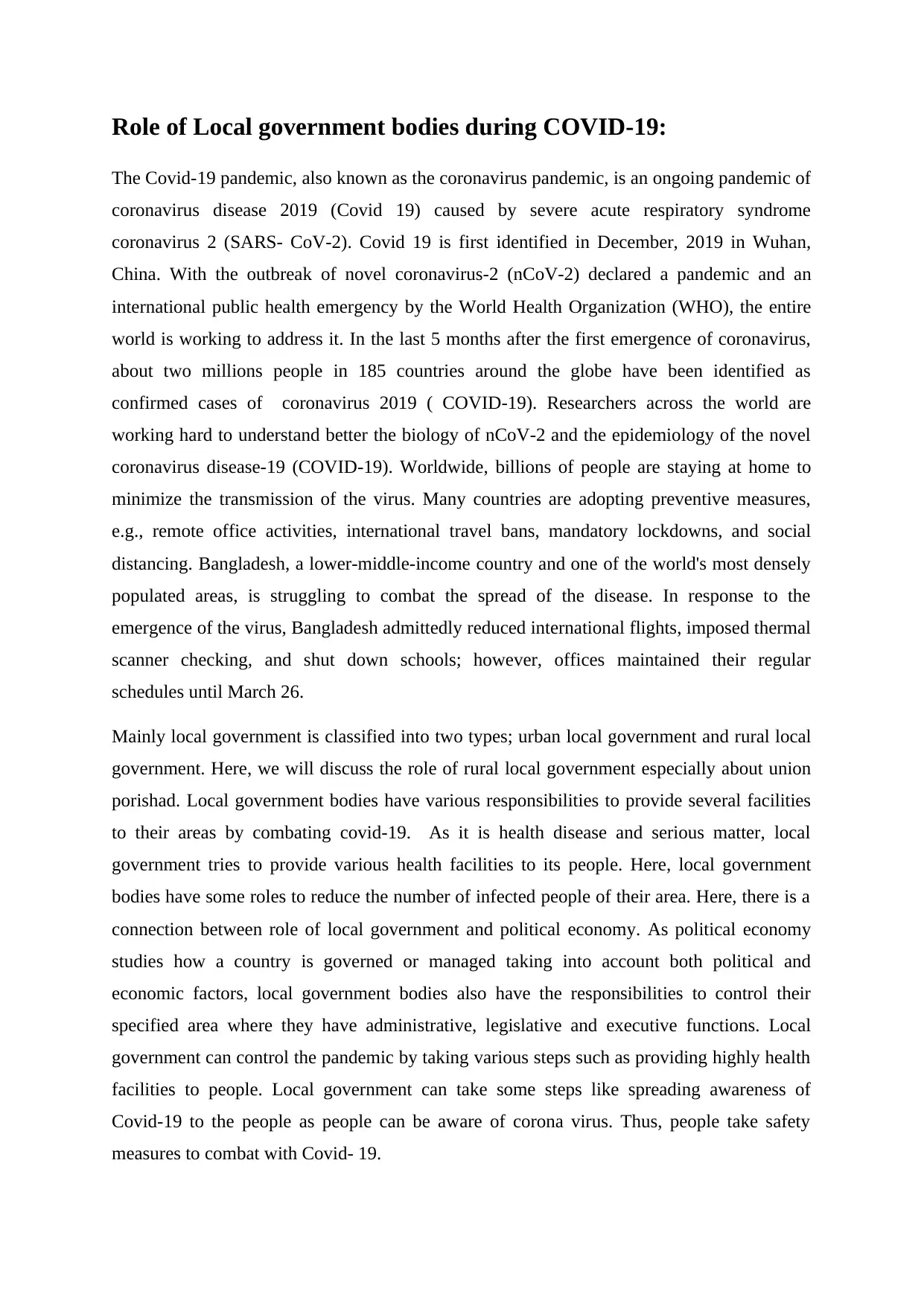
Role of Local government bodies during COVID-19:
The Covid-19 pandemic, also known as the coronavirus pandemic, is an ongoing pandemic of
coronavirus disease 2019 (Covid 19) caused by severe acute respiratory syndrome
coronavirus 2 (SARS- CoV-2). Covid 19 is first identified in December, 2019 in Wuhan,
China. With the outbreak of novel coronavirus-2 (nCoV-2) declared a pandemic and an
international public health emergency by the World Health Organization (WHO), the entire
world is working to address it. In the last 5 months after the first emergence of coronavirus,
about two millions people in 185 countries around the globe have been identified as
confirmed cases of coronavirus 2019 ( COVID-19). Researchers across the world are
working hard to understand better the biology of nCoV-2 and the epidemiology of the novel
coronavirus disease-19 (COVID-19). Worldwide, billions of people are staying at home to
minimize the transmission of the virus. Many countries are adopting preventive measures,
e.g., remote office activities, international travel bans, mandatory lockdowns, and social
distancing. Bangladesh, a lower-middle-income country and one of the world's most densely
populated areas, is struggling to combat the spread of the disease. In response to the
emergence of the virus, Bangladesh admittedly reduced international flights, imposed thermal
scanner checking, and shut down schools; however, offices maintained their regular
schedules until March 26.
Mainly local government is classified into two types; urban local government and rural local
government. Here, we will discuss the role of rural local government especially about union
porishad. Local government bodies have various responsibilities to provide several facilities
to their areas by combating covid-19. As it is health disease and serious matter, local
government tries to provide various health facilities to its people. Here, local government
bodies have some roles to reduce the number of infected people of their area. Here, there is a
connection between role of local government and political economy. As political economy
studies how a country is governed or managed taking into account both political and
economic factors, local government bodies also have the responsibilities to control their
specified area where they have administrative, legislative and executive functions. Local
government can control the pandemic by taking various steps such as providing highly health
facilities to people. Local government can take some steps like spreading awareness of
Covid-19 to the people as people can be aware of corona virus. Thus, people take safety
measures to combat with Covid- 19.
The Covid-19 pandemic, also known as the coronavirus pandemic, is an ongoing pandemic of
coronavirus disease 2019 (Covid 19) caused by severe acute respiratory syndrome
coronavirus 2 (SARS- CoV-2). Covid 19 is first identified in December, 2019 in Wuhan,
China. With the outbreak of novel coronavirus-2 (nCoV-2) declared a pandemic and an
international public health emergency by the World Health Organization (WHO), the entire
world is working to address it. In the last 5 months after the first emergence of coronavirus,
about two millions people in 185 countries around the globe have been identified as
confirmed cases of coronavirus 2019 ( COVID-19). Researchers across the world are
working hard to understand better the biology of nCoV-2 and the epidemiology of the novel
coronavirus disease-19 (COVID-19). Worldwide, billions of people are staying at home to
minimize the transmission of the virus. Many countries are adopting preventive measures,
e.g., remote office activities, international travel bans, mandatory lockdowns, and social
distancing. Bangladesh, a lower-middle-income country and one of the world's most densely
populated areas, is struggling to combat the spread of the disease. In response to the
emergence of the virus, Bangladesh admittedly reduced international flights, imposed thermal
scanner checking, and shut down schools; however, offices maintained their regular
schedules until March 26.
Mainly local government is classified into two types; urban local government and rural local
government. Here, we will discuss the role of rural local government especially about union
porishad. Local government bodies have various responsibilities to provide several facilities
to their areas by combating covid-19. As it is health disease and serious matter, local
government tries to provide various health facilities to its people. Here, local government
bodies have some roles to reduce the number of infected people of their area. Here, there is a
connection between role of local government and political economy. As political economy
studies how a country is governed or managed taking into account both political and
economic factors, local government bodies also have the responsibilities to control their
specified area where they have administrative, legislative and executive functions. Local
government can control the pandemic by taking various steps such as providing highly health
facilities to people. Local government can take some steps like spreading awareness of
Covid-19 to the people as people can be aware of corona virus. Thus, people take safety
measures to combat with Covid- 19.
⊘ This is a preview!⊘
Do you want full access?
Subscribe today to unlock all pages.

Trusted by 1+ million students worldwide
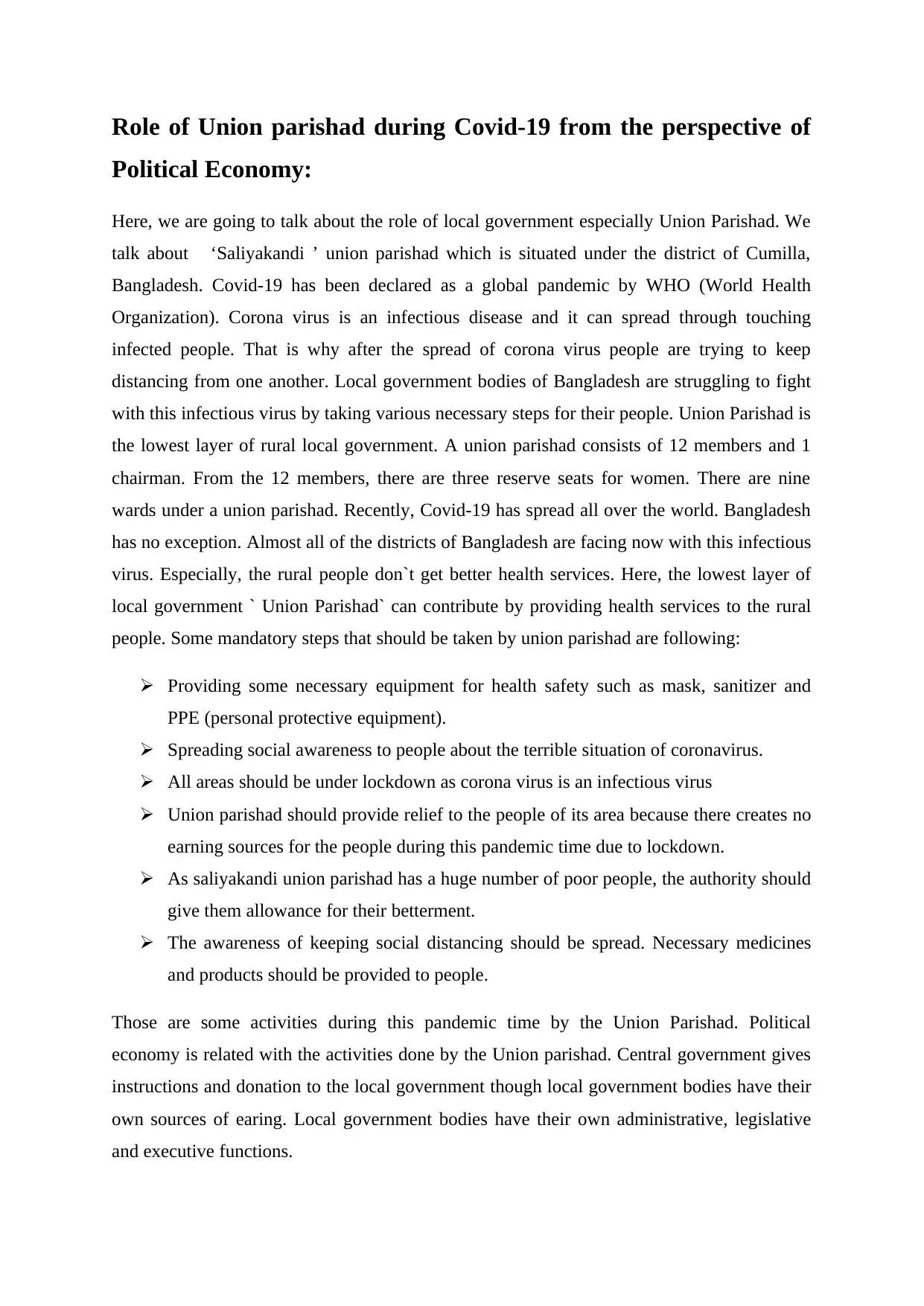
Role of Union parishad during Covid-19 from the perspective of
Political Economy:
Here, we are going to talk about the role of local government especially Union Parishad. We
talk about ‘Saliyakandi ’ union parishad which is situated under the district of Cumilla,
Bangladesh. Covid-19 has been declared as a global pandemic by WHO (World Health
Organization). Corona virus is an infectious disease and it can spread through touching
infected people. That is why after the spread of corona virus people are trying to keep
distancing from one another. Local government bodies of Bangladesh are struggling to fight
with this infectious virus by taking various necessary steps for their people. Union Parishad is
the lowest layer of rural local government. A union parishad consists of 12 members and 1
chairman. From the 12 members, there are three reserve seats for women. There are nine
wards under a union parishad. Recently, Covid-19 has spread all over the world. Bangladesh
has no exception. Almost all of the districts of Bangladesh are facing now with this infectious
virus. Especially, the rural people don`t get better health services. Here, the lowest layer of
local government ` Union Parishad` can contribute by providing health services to the rural
people. Some mandatory steps that should be taken by union parishad are following:
Providing some necessary equipment for health safety such as mask, sanitizer and
PPE (personal protective equipment).
Spreading social awareness to people about the terrible situation of coronavirus.
All areas should be under lockdown as corona virus is an infectious virus
Union parishad should provide relief to the people of its area because there creates no
earning sources for the people during this pandemic time due to lockdown.
As saliyakandi union parishad has a huge number of poor people, the authority should
give them allowance for their betterment.
The awareness of keeping social distancing should be spread. Necessary medicines
and products should be provided to people.
Those are some activities during this pandemic time by the Union Parishad. Political
economy is related with the activities done by the Union parishad. Central government gives
instructions and donation to the local government though local government bodies have their
own sources of earing. Local government bodies have their own administrative, legislative
and executive functions.
Political Economy:
Here, we are going to talk about the role of local government especially Union Parishad. We
talk about ‘Saliyakandi ’ union parishad which is situated under the district of Cumilla,
Bangladesh. Covid-19 has been declared as a global pandemic by WHO (World Health
Organization). Corona virus is an infectious disease and it can spread through touching
infected people. That is why after the spread of corona virus people are trying to keep
distancing from one another. Local government bodies of Bangladesh are struggling to fight
with this infectious virus by taking various necessary steps for their people. Union Parishad is
the lowest layer of rural local government. A union parishad consists of 12 members and 1
chairman. From the 12 members, there are three reserve seats for women. There are nine
wards under a union parishad. Recently, Covid-19 has spread all over the world. Bangladesh
has no exception. Almost all of the districts of Bangladesh are facing now with this infectious
virus. Especially, the rural people don`t get better health services. Here, the lowest layer of
local government ` Union Parishad` can contribute by providing health services to the rural
people. Some mandatory steps that should be taken by union parishad are following:
Providing some necessary equipment for health safety such as mask, sanitizer and
PPE (personal protective equipment).
Spreading social awareness to people about the terrible situation of coronavirus.
All areas should be under lockdown as corona virus is an infectious virus
Union parishad should provide relief to the people of its area because there creates no
earning sources for the people during this pandemic time due to lockdown.
As saliyakandi union parishad has a huge number of poor people, the authority should
give them allowance for their betterment.
The awareness of keeping social distancing should be spread. Necessary medicines
and products should be provided to people.
Those are some activities during this pandemic time by the Union Parishad. Political
economy is related with the activities done by the Union parishad. Central government gives
instructions and donation to the local government though local government bodies have their
own sources of earing. Local government bodies have their own administrative, legislative
and executive functions.
Paraphrase This Document
Need a fresh take? Get an instant paraphrase of this document with our AI Paraphraser
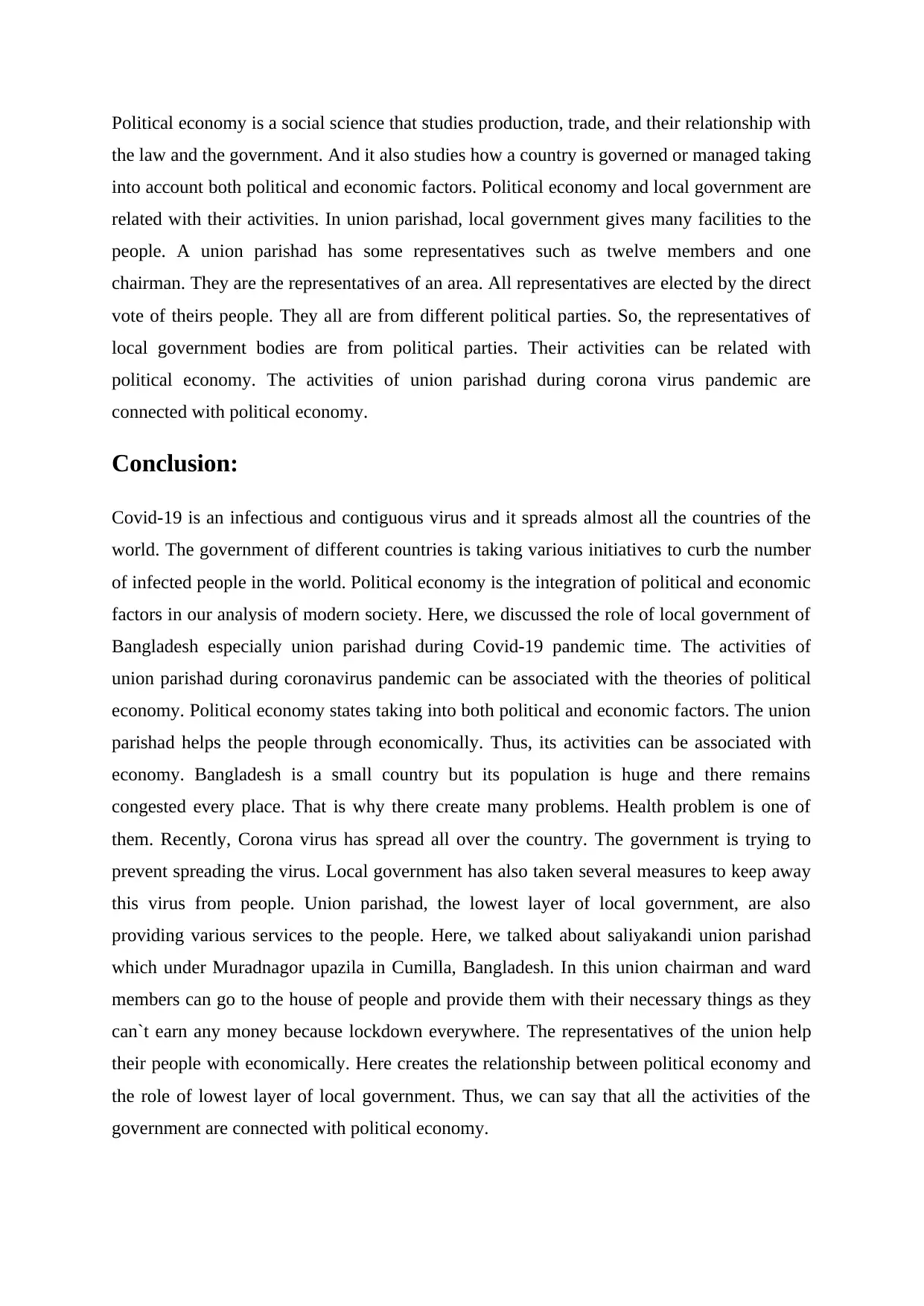
Political economy is a social science that studies production, trade, and their relationship with
the law and the government. And it also studies how a country is governed or managed taking
into account both political and economic factors. Political economy and local government are
related with their activities. In union parishad, local government gives many facilities to the
people. A union parishad has some representatives such as twelve members and one
chairman. They are the representatives of an area. All representatives are elected by the direct
vote of theirs people. They all are from different political parties. So, the representatives of
local government bodies are from political parties. Their activities can be related with
political economy. The activities of union parishad during corona virus pandemic are
connected with political economy.
Conclusion:
Covid-19 is an infectious and contiguous virus and it spreads almost all the countries of the
world. The government of different countries is taking various initiatives to curb the number
of infected people in the world. Political economy is the integration of political and economic
factors in our analysis of modern society. Here, we discussed the role of local government of
Bangladesh especially union parishad during Covid-19 pandemic time. The activities of
union parishad during coronavirus pandemic can be associated with the theories of political
economy. Political economy states taking into both political and economic factors. The union
parishad helps the people through economically. Thus, its activities can be associated with
economy. Bangladesh is a small country but its population is huge and there remains
congested every place. That is why there create many problems. Health problem is one of
them. Recently, Corona virus has spread all over the country. The government is trying to
prevent spreading the virus. Local government has also taken several measures to keep away
this virus from people. Union parishad, the lowest layer of local government, are also
providing various services to the people. Here, we talked about saliyakandi union parishad
which under Muradnagor upazila in Cumilla, Bangladesh. In this union chairman and ward
members can go to the house of people and provide them with their necessary things as they
can`t earn any money because lockdown everywhere. The representatives of the union help
their people with economically. Here creates the relationship between political economy and
the role of lowest layer of local government. Thus, we can say that all the activities of the
government are connected with political economy.
the law and the government. And it also studies how a country is governed or managed taking
into account both political and economic factors. Political economy and local government are
related with their activities. In union parishad, local government gives many facilities to the
people. A union parishad has some representatives such as twelve members and one
chairman. They are the representatives of an area. All representatives are elected by the direct
vote of theirs people. They all are from different political parties. So, the representatives of
local government bodies are from political parties. Their activities can be related with
political economy. The activities of union parishad during corona virus pandemic are
connected with political economy.
Conclusion:
Covid-19 is an infectious and contiguous virus and it spreads almost all the countries of the
world. The government of different countries is taking various initiatives to curb the number
of infected people in the world. Political economy is the integration of political and economic
factors in our analysis of modern society. Here, we discussed the role of local government of
Bangladesh especially union parishad during Covid-19 pandemic time. The activities of
union parishad during coronavirus pandemic can be associated with the theories of political
economy. Political economy states taking into both political and economic factors. The union
parishad helps the people through economically. Thus, its activities can be associated with
economy. Bangladesh is a small country but its population is huge and there remains
congested every place. That is why there create many problems. Health problem is one of
them. Recently, Corona virus has spread all over the country. The government is trying to
prevent spreading the virus. Local government has also taken several measures to keep away
this virus from people. Union parishad, the lowest layer of local government, are also
providing various services to the people. Here, we talked about saliyakandi union parishad
which under Muradnagor upazila in Cumilla, Bangladesh. In this union chairman and ward
members can go to the house of people and provide them with their necessary things as they
can`t earn any money because lockdown everywhere. The representatives of the union help
their people with economically. Here creates the relationship between political economy and
the role of lowest layer of local government. Thus, we can say that all the activities of the
government are connected with political economy.
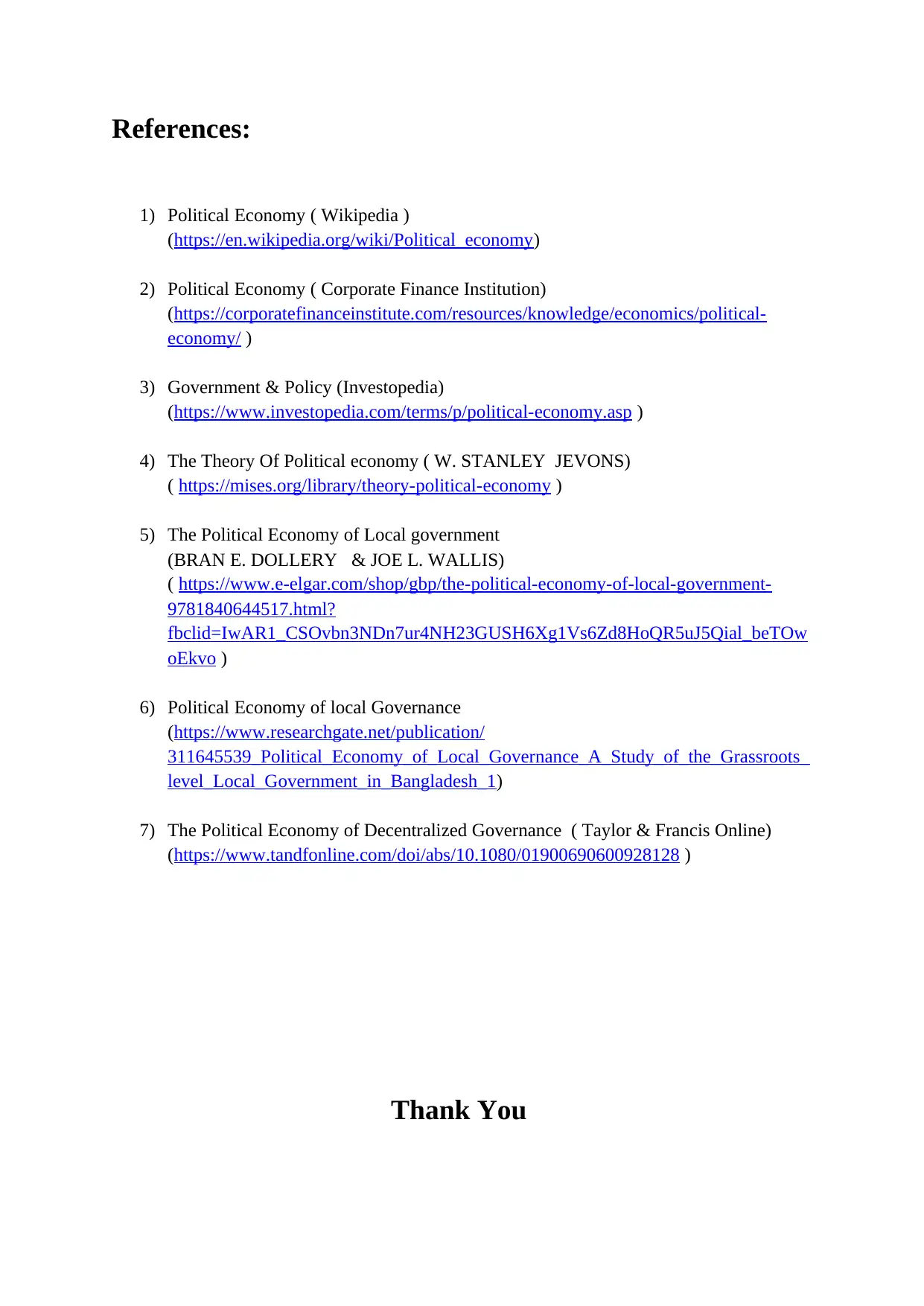
References:
1) Political Economy ( Wikipedia )
(https://en.wikipedia.org/wiki/Political_economy)
2) Political Economy ( Corporate Finance Institution)
(https://corporatefinanceinstitute.com/resources/knowledge/economics/political-
economy/ )
3) Government & Policy (Investopedia)
(https://www.investopedia.com/terms/p/political-economy.asp )
4) The Theory Of Political economy ( W. STANLEY JEVONS)
( https://mises.org/library/theory-political-economy )
5) The Political Economy of Local government
(BRAN E. DOLLERY & JOE L. WALLIS)
( https://www.e-elgar.com/shop/gbp/the-political-economy-of-local-government-
9781840644517.html?
fbclid=IwAR1_CSOvbn3NDn7ur4NH23GUSH6Xg1Vs6Zd8HoQR5uJ5Qial_beTOw
oEkvo )
6) Political Economy of local Governance
(https://www.researchgate.net/publication/
311645539_Political_Economy_of_Local_Governance_A_Study_of_the_Grassroots_
level_Local_Government_in_Bangladesh_1)
7) The Political Economy of Decentralized Governance ( Taylor & Francis Online)
(https://www.tandfonline.com/doi/abs/10.1080/01900690600928128 )
Thank You
1) Political Economy ( Wikipedia )
(https://en.wikipedia.org/wiki/Political_economy)
2) Political Economy ( Corporate Finance Institution)
(https://corporatefinanceinstitute.com/resources/knowledge/economics/political-
economy/ )
3) Government & Policy (Investopedia)
(https://www.investopedia.com/terms/p/political-economy.asp )
4) The Theory Of Political economy ( W. STANLEY JEVONS)
( https://mises.org/library/theory-political-economy )
5) The Political Economy of Local government
(BRAN E. DOLLERY & JOE L. WALLIS)
( https://www.e-elgar.com/shop/gbp/the-political-economy-of-local-government-
9781840644517.html?
fbclid=IwAR1_CSOvbn3NDn7ur4NH23GUSH6Xg1Vs6Zd8HoQR5uJ5Qial_beTOw
oEkvo )
6) Political Economy of local Governance
(https://www.researchgate.net/publication/
311645539_Political_Economy_of_Local_Governance_A_Study_of_the_Grassroots_
level_Local_Government_in_Bangladesh_1)
7) The Political Economy of Decentralized Governance ( Taylor & Francis Online)
(https://www.tandfonline.com/doi/abs/10.1080/01900690600928128 )
Thank You
⊘ This is a preview!⊘
Do you want full access?
Subscribe today to unlock all pages.

Trusted by 1+ million students worldwide
1 out of 13
Related Documents
Your All-in-One AI-Powered Toolkit for Academic Success.
+13062052269
info@desklib.com
Available 24*7 on WhatsApp / Email
![[object Object]](/_next/static/media/star-bottom.7253800d.svg)
Unlock your academic potential
Copyright © 2020–2026 A2Z Services. All Rights Reserved. Developed and managed by ZUCOL.





